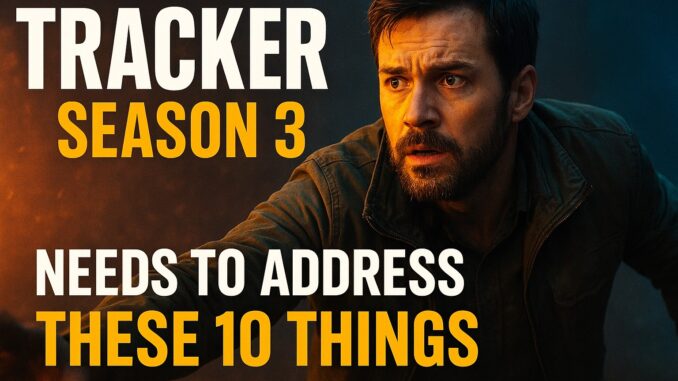
Tracker Season 3 Needs To Address These 10 Things
“Tracker” has gripped audiences with intrigue, suspense, and complex characters. But as we look toward Season 3, there are several holes, frustrations, and missed opportunities that, if unaddressed, could weaken the series’ momentum. In this article, I’m breaking down the 10 things that Season 3 must address — from plot consistency to character arcs, pacing to fan expectations. Let’s dig in.
1. Clarify the Villain’s Motivation
Why Ambiguity Is Hurting the Story
Fans love mysteries, but when a villain’s reason for targeting protagonists seems vague, the tension collapses. In Season 2, the antagonist’s goals felt overshadowed by action scenes. If Season 3 doesn’t clarify why the villain is doing what they do — their backstory, what they want, and what drives them — character stakes feel hollow.
How to Make Motivation Feel Real
-
Show flashbacks or key moments that shaped them.
-
Let their goals collide meaningfully with the hero’s goals.
-
Give emotional consequences — not just physical stakes.
2. Resolve Plot Inconsistencies
Don’t Ignore the Little Things
Earlier seasons left small plot threads dangling: timing issues, unexplained tech behavior, or characters acting out of character. Season 3 must double-check the internal logic. Even one contradicting fact can break immersion.
Examples of Inconsistency Fallout
-
The GPS tracker that fails but suddenly works without explanation.
-
A character’s knowledge changing conveniently from episode to episode.
-
Timeline jumps that make relationships confusing.
3. Deepen Character Development Beyond the Hero
Supporting Cast Deserves Attention Too
While our leads get most of the limelight, many secondary characters have been sidelines. Viewers want to see more: the sidekick, the tech-wizard, even the moral anchor. Give them arcs, conflicts, growth.
Strategies for Stronger Side Characters
-
Give them a subplot that ties into the main storyline.
-
Let them make mistakes and face consequences.
-
Show their vulnerabilities, not just strengths.
4. Improve Pacing — Balance Between Action and Breather
We Need Moments That Let Us Catch Our Breath
Constant chase scenes, non-stop action might excite, but overload will exhaust. Season 3 should alternate high intensity with quieter, reflection-driven moments. Those small pauses make the big moments hit much harder.
How to Pace More Effectively
-
Insert character-driven scenes between big twists.
-
Use foreshadowing but allow suspense to build slowly.
-
Avoid back-to-back high-stakes scenes without emotional payoff.
5. Address Fan Questions Left Unanswered
Lurking Mysteries That Fans Still Talk About
There are mysteries from past seasons fans discuss often: “What really happened to X?”, “Why was this clue dropped?”, “Who tipped off the enemy?” Season 3 should pick up these threads and provide satisfying answers.
Which Questions Top the List
-
The betrayal subplot — who pulled the strings?
-
The origins of the tracking device.
-
The secret identity revealed only in whispers.
6. Upgrade the Stakes Without Overdoing It
The Danger of Escalation Fatigue
Yes, things should escalate. But when everything becomes life-or-death in every scene, the danger zones lose meaning. Season 3 needs to pick its moments — not make every twist a catastrophe.
Ways to Raise Stakes Smartly
-
Personal stakes (family, identity) instead of just physical harm.
-
Moral dilemmas.
-
Conflicts that affect more than just the protagonists.
7. Strengthen Dialogue with Realism
Authentic Voices Over Expository Monologues
Too often, “Tracker” leans into info-dump dialogues to move plot. That can feel forced. Characters should speak how people would: fragmented, emotional, sometimes contradictory. Let humor, hesitation, and silence say things too.
Dialogue Tips for Season 3
-
Use interruptions, conflicting opinions.
-
Let characters talk around things. Unspoken tension is powerful.
-
Cut the jargon unless it’s essential — explain, don’t overload.
8. Make Character Relationships Earned
No More One-Episode Friendships or Romances
Relationships have felt rushed. Bonding simply because two people shared a fight isn’t enough. Viewers want incremental trust, missteps, betrayals, reconciliations. That journey is what feels real.
What Scotland Calls Slow Burn
-
Let friendships strain. Let romance have doubt.
-
Characters change opinions of each other over time.
-
Shared trauma, revealed secrets — let those test the bond.
9. Tighten the Technology & Gadget Logic
Tech Might Be Fictional — But Rules Help
“Tracker” features trackers, hacking, surveillance tech. If the science or mechanics keep bending for plot convenience, it undermines credibility. Season 3 should establish rules early, and stick to them.
Examples of Solid Tech Integration
-
Show how tracking devices drain battery, get compromised, or are hacked.
-
Demonstrate vulnerabilities.
-
Keep the tech limitations in play — and let conflicts come out of them.
10. Balance Surprise With Payoff
Twists Are Great — But Not Just for Shock Value
A twist that serves no purpose feels cheap. Fans remember twists that changed character arcs or re-framed everything. Season 3 should strive for surprises that deepen the story — not just shock.
How to Do Payoff Well
-
Plant seeds early so surprises feel earned.
-
Revisit past clues; let fans feel smart for noticing.
-
Use twist aftermath to explore character consequences — not just move you to the next fight.
Other Important Aspects Tracker Season 3 Should Nail
Visual and Cinematic Consistency
Even visuals matter. Lighting, style, color palette — these should feel consistent so the mood supports the narrative. A sudden shift in style (without reason) disorients viewers.

Soundtrack and Atmosphere Amplify Emotion
Music cues, ambient sound, silence — these build tension. If they’re misused or inconsistent, even great dialogue or acting may fall flat. Season 3 should lean in on atmospheric storytelling.
Character Moral Ambiguity
The best shows make us question who’s good or bad. Let characters have grey zones. Let trusted characters betray you; let villains be sympathetic. That tension is gold.
Conclusion
Season 3 of Tracker stands at a crossroads. It can surge forward, deepening its lore, sharpening its characters, and satisfying its fans — or stall, unraveling what made it great. By clarifying motivations, resolving inconsistencies, giving secondary characters room to breathe, pacing wisely, and ensuring that surprises matter, Tracker can level up. It’s about trust: trust that the audience cares, that the writers respect the rules they set, and that every twist, every moment, has earned its place. If the show addresses these 10 things, Season 3 won’t just survive — it could become its strongest chapter yet.
FAQs
Q1: Will addressing all 10 issues guarantee Season 3 success?
Not automatically. But tackling these problems dramatically increases the chance Tracker will resonate with its audience. Execution matters — good writing, consistent tone, strong performances.
Q2: Is it possible to fix these things without overhauling the show completely?
Yes. Many are tweaks rather than reboots: tightening plot threads, improving character arcs, striking a better balance between action and quiet. These shifts can often happen within the existing framework.
Q3: What if fans disagree on what needs fixing?
That’s natural — part of fandom is varied opinions. The goal isn’t to please everyone, but to make the story coherent, emotionally satisfying, and true to its themes. Feedback helps, but creators must pick a vision.
Q4: How can surprise twists feel earned and not cheap?
By foreshadowing, giving clues, establishing rules, and ensuring consequences. Rewarding viewers who’ve paid attention — without making things obvious — makes twists feel impactful and respectful.
Q5: Should fan theories influence how the show changes Season 3?
Fan theories can be inspiring, but they shouldn’t dictate the story. It’s fine to reference what fans think, but change should come from what serves the narrative best — not just what’s trending.